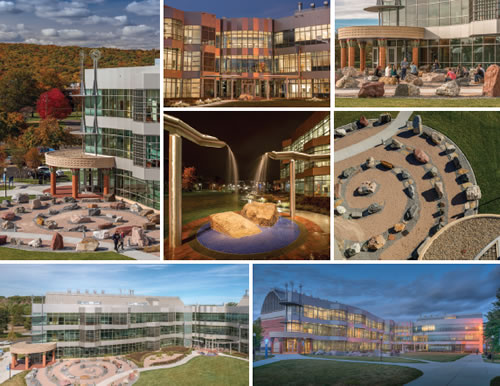Southern Connecticut State University: Academic Science and Laboratory Building

PHOTOS © NATHANIEL RILEY PHOTOGRAPHY
While the vast majority
of prominent design features
at Southern Connecticut
State University’s (SCSU) Academic & Science Laboratory Building are incorporated
into the structure itself, its adjacent
geological rock garden plays a prominent
role within the “science enclave.”
In keeping with a theme that permeates
Centerbrook Architects & Planners’ design
of the 104,000-square-foot building that
opened for the 2015-16 academic year on
SCSU’s New Haven campus, the geological
rock garden is a teaching tool as well as an
expression of art.
Thomas Fleming, professor of earth
science at SCSU, oversaw the collection
of the stones, which are comprised of 52
different boulders indigenous to Connecticut.
Positioned along a spiraling
pathway near the entrance of the building,
the geological garden is a hands-on
educational display that also serves as an
outdoor classroom.
Typical classroom rock and mineral
samples are inches in size while geological
garden rocks are measured in feet. This
better simulates what is found in an actual
rock outcrop in the field, and provides
students with more realistic observations
regarding texture and orientation. At that
scale, students can also measure features
like foliation and bedding that are difficult
to observe in a traditional classroom.
Numerous quarries across Connecticut
donated the rocks, which also affords an
opportunity to learn about their history
and operations. For example, one of the
sources — Stony Creek Quarry — has provided
its distinctive pink stone for many
iconic buildings and monuments, including
the pedestal of the Statue of Liberty and
the foundations for the Brooklyn Bridge.
See a video of the project at vimeo.com/142171216.
This article originally appeared in the issue of .